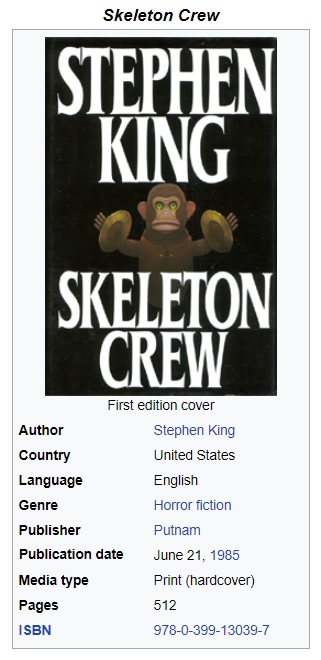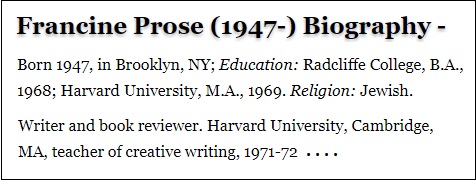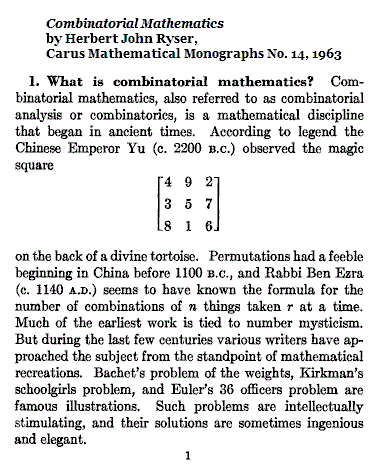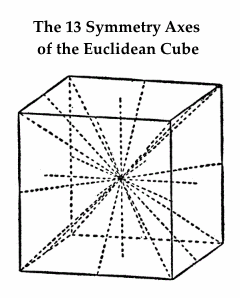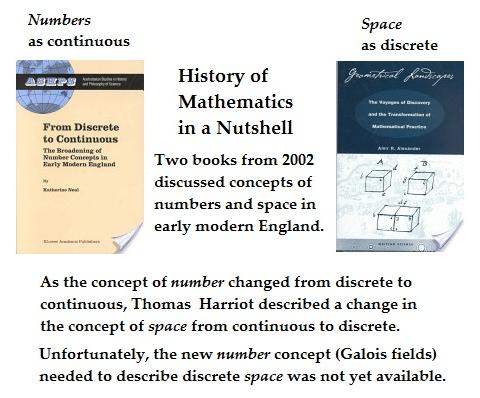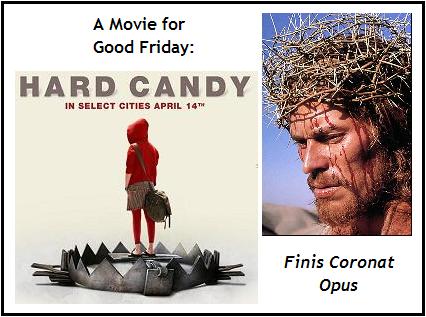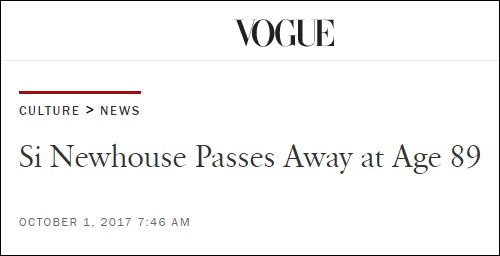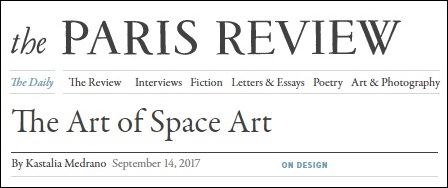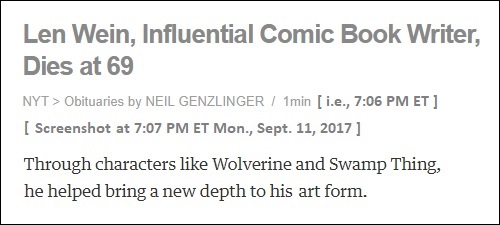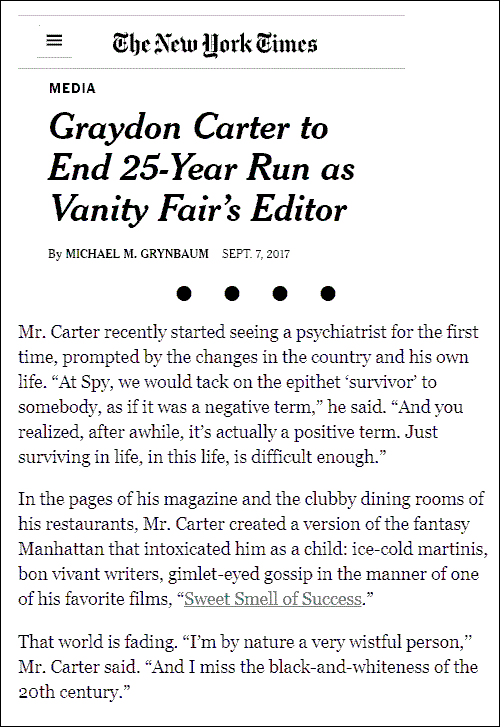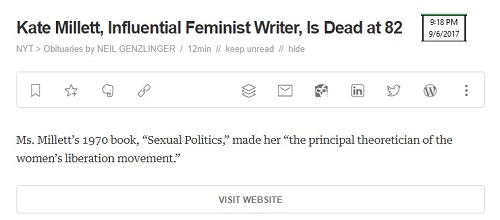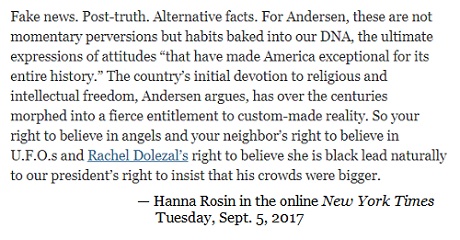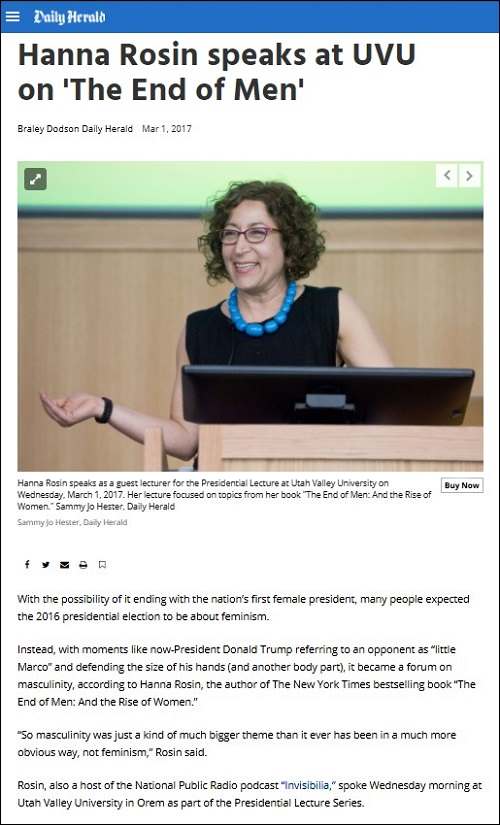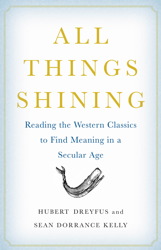* See as well "Public Square" in other posts.
Monday, October 23, 2017
Sunday, October 22, 2017
Noesis
See "Imagination and Layered Ontology in Greek Mathematics,"
by Reviel Netz, at
See also …
Some background — Posts now tagged Noesis.
Saturday, October 21, 2017
Crimson Algebra
"Category theory has become the central gateway
through which to learn pure mathematics."
— David Spivak, Harvard Math Table, Oct. 24, 2017
— The New Yorker , issue of October 23, 2017
See as well posts tagged Death Warmed Over.
Shift Lock
"As many philosophers have noted, in the German language,
the word Schein bears three distinct meanings:
(i) shining, radiance, luminosity
(ii) manifesting, phenomenal appearing, showing itself, coming to light
(iii) illusion, deception, semblance, 'mere' appearance
In the Greek language of Plato's thought, the first two meanings were
bound together by their etymology. But Plato's metaphysics, drawing
a line of irreconcilable separation between the reality of a higher realm
of pure Ideas and the illusoriness of a lower realm consisting of sensuous
appearances, exhibits a logic that he saw connecting inextricably all three
of these seemingly unconnected meanings."
— Levin, David Michael. The Philosopher's Gaze:
Modernity in the Shadows of Enlightenment .
Part III, Section 10: "Where the Beauty of Truth Lies."
Berkeley: University of California Press, 1999.
Back to Halloween Season
Friday, October 20, 2017
Punch Lines
From a post last month —
"You're gonna need a bigger boat."
— Roy Scheider in "Jaws"
"We're gonna need more holy water."
— "Season of the Witch"
… and for Tom Hanks, Dan Brown, and Francine Prose —
Heart of the Monkey God
In Memoriam
"Renowned Canadian theologian Gregory Baum, 94,
author of the first draft of the Second Vatican Council's
'Nostra Aetate,' died Oct. 18 in a Montreal hospital."
— National Catholic Reporter , Oct. 20, 2017
October 18 was St. Luke's Day.
From the Log24 post "Prose" on that date —
"Mister Monkey . . . . is also Hanuman, the Hindu monkey god . . . ."
— Cathleeen Schine in an online October 17 NY Times review.
From the novel under review —
"Only the heart of the monkey god is large enough
to contain the hearts and souls of all the monkeys,
all the humans, the gods, every shining thread
that connects them."
— Francine Prose, Mister Monkey: A Novel (p. 263).
HarperCollins. Kindle Edition.
See as well all posts now tagged Prose Monkey.
Thursday, October 19, 2017
Design Grammar***
The elementary shapes at the top of the figure below mirror
the looking-glass property of the classical Lo Shu square.
The nine shapes at top left* and their looking-glass reflection
illustrate the looking-glass reflection relating two orthogonal
Latin squares over the three digits of modulo-three arithmetic.
Combining these two orthogonal Latin squares,** we have a
representation in base three of the numbers from 0 to 8.
Adding 1 to each of these numbers yields the Lo Shu square.

* The array at top left is from the cover of
Wonder Years:
Werkplaats Typografie 1998-2008.
** A well-known construction.
*** For other instances of what might be
called "design grammar" in combinatorics,
see a slide presentation by Robin Wilson.
No reference to the work of Chomsky is
intended.
Graphic Design: Fast Forward
Prose (continued from yesterday)
"While Prose's adult works have touched on various subjects,
her fiction for children, which she began writing in earnest
in the mid-1990s, all has a basis in Jewish folklore."
» Read more.
Aficionados of what Dan Brown has called "symbology"
can read about the above right-chevrons symbol in
Fast Forward, a post of November 21, 2010.
And Howe
The Harvard Crimson , Feb. 28, 2017 —
Cambridge City Councillors formally requested that the Cambridge
Historical Commission consider designating the Abbott Building in
Harvard Square as a historical landmark at its weekly meeting Monday.
. . . .
“There are only a few gems that give the really Square character.”
Councillor Dennis J. Carlone said. “And in the heart of the square,
it’s this building.”

See as well the cover of
The Monkey Grammarian ,
a book by Octavio Paz —
A related NPR book review yesterday —
"Like Curious George , another vaguely imperialist children's classic —
which Prose refers to frequently — the simian hero of Mister Monkey
gets into trouble in his new urban environment."
Wednesday, October 18, 2017
Prose
New York Times review of a new novel by Francine Prose —
"Mister Monkey . . . . is also Hanuman, the Hindu monkey god . . . ."
— Cathleeen Schine in in the above October 17 review.
A related book —
See as well The Monkey Grammarian in this journal.
Three Small Grids
An earlier post today, now tagged "Three Small Magic Squares,"
suggests a review of a post from October 25 three years ago
that contains the following figure —

Fans of the October Revolution may enjoy a passage
by Rosalind Krauss on grids:

Bach for String Quartet
See also Bach + Quartet in this journal.
Dürer for St. Luke’s Day
Structure of the Dürer magic square
16 3 2 13
5 10 11 8 decreased by 1 is …
9 6 7 12
4 15 14 1
15 2 1 12
4 9 10 7
8 5 6 11
3 14 13 0 .
Base 4 —
33 02 01 30
10 21 22 13
20 11 12 23
03 32 31 00 .
Two-part decomposition of base-4 array
as two (non-Latin) orthogonal arrays —
3 0 0 3 3 2 1 0
1 2 2 1 0 1 2 3
2 1 1 2 0 1 2 3
0 3 3 0 3 2 1 0 .
Base 2 –
1111 0010 0001 1100
0100 1001 1010 0111
1000 0101 0110 1011
0011 1110 1101 0000 .
Four-part decomposition of base-2 array
as four affine hyperplanes over GF(2) —
1001 1001 1100 1010
0110 1001 0011 0101
1001 0110 0011 0101
0110 0110 1100 1010 .
— Steven H. Cullinane,
October 18, 2017
See also recent related analyses of
noted 3×3 and 5×5 magic squares.
Tuesday, October 17, 2017
Plan 9 Continues
See also Holy Field in this journal.
Some related mathematics —
Analysis of the Lo Shu structure —
Structure of the 3×3 magic square:
4 9 2
3 5 7 decreased by 1 is …
8 1 6
3 8 1
2 4 6
7 0 5
In base 3 —
10 22 01
02 11 20
21 00 12
As orthogonal Latin squares
(a well-known construction) —
1 2 0 0 2 1
0 1 2 2 1 0
2 0 1 1 0 2 .
— Steven H. Cullinane,
October 17, 2017
The Movement of Analogy
The title is a phrase by Octavio Paz from today's post
"Status Symbols."
Other phrases from a link target in Sunday's post
The Strength at the Centre —
… a single world
In which he is and as and is are one.
See also Four Dots in this journal.
News from Jarvis (for Tony Stark)
From the first New York Times Wire item below …
<meta property="article:published"
itemprop="datePublished"
content="2017-10-17T14:55:26-04:00" />

Status Symbols
"Status: Defunct" …
As is now its owner, who reportedly
died at 80 on Sunday, October 15, 2017.
In memoriam —
Excerpts from Log24 posts on Sunday night
and yesterday evening —
 .
.
" … listen: there's a hell
of a good universe next door; let's go"
— e. e. cummings
Some literary background —
|
"At the point of convergence by Octavio Paz, translated by Helen Lane
|
Monday, October 16, 2017
Halloween Meditation
Box Office Report —
"Only a peculiar can enter a time loop."
A post from Halloween season seven years ago last Saturday —
Related material — This morning's "Highway 61 Revisited."
Reply to a Creepy Christmas Message
In memory of Marian Cannon Schlesinger,
who reportedly died on Saturday, October 14, 2017
University Diaries on December 25, 2016 —
"You could say UD currently sits (she’s in the library
at five AM) at the pinnacle of elitism; you could say
she ain’t climbing any higher than atop this soft
leather chair resting on one of the gargantuan rugs
Galbraith or Galbraith junior brought back from India
or Afghanistan. But it’s only the trappings. What’s
been able to be held in amber. This place is the
genuine Henry James (Harvard Law, 1872):
The affluent society, expansive, sedate; and
the cry of pain almost out of earshot."
Presumably UD means the noted author Henry James.
A fact check does not bear out her "Harvard Law, 1872" remark.
For this Halloween season, a creepy passage from James —

Highway 61 Revisited
"God said to Abraham …." — Bob Dylan, "Highway 61 Revisited"
Related material —
-
"Inner Truth" in this journal
-
"On Linguistic Creation," June 25, 1999
-
"Ultra Super Magic Squares of 5×5" at
http://mathsforeurope.digibel.be/magic.htm .
See as well Charles Small, Harvard '64,
"Magic Squares over Fields" —
— and Conway-Norton-Ryba in this journal.
Some remarks on an order-five magic square over GF(52):
on the numbers 0 to 24:
22 5 18 1 14
3 11 24 7 15
9 17 0 13 21
10 23 6 19 2
16 4 12 20 8
Base-5:
42 10 33 01 24
03 21 44 12 30
14 32 00 23 41
20 43 11 34 02
31 04 22 40 13
Regarding the above digits as representing
elements of the vector 2-space over GF(5)
(or the vector 1-space over GF(52)) …
All vector row sums = (0, 0) (or 0, over GF(52)).
All vector column sums = same.
Above array as two
orthogonal Latin squares:
4 1 3 0 2 2 0 3 1 4
0 2 4 1 3 3 1 4 2 0
1 3 0 2 4 4 2 0 3 1
2 4 1 3 0 0 3 1 4 2
3 0 2 4 1 1 4 2 0 3
— Steven H. Cullinane,
October 16, 2017
Meta Property
From The New York Times this morning —
Where the Journey
is the Destination
A writer finds emotional solace on some of
Norway’s scenic remote roads, which have been
transformed into architectural wonders.
By ONDINE COHANE OCT. 16, 2017
. . . .
"… another project conceived along these routes is
the Juvet Landscape Hotel, designed by the architects
Jensen & Skodvin, and the creepy, if incredibly appropriate
aesthetically, setting for the 2015 film 'Ex Machina.' "
<meta property="article:published"
itemprop="datePublished"
content="2017-10-16T00:01:38-04:00" />
Sunday, October 15, 2017
Saturday Night Not-So-Live
Hillel Italie at AP News —
"Richard Wilbur, the Pulitzer Prize-winning poet and translator
who intrigued and delighted generations of readers and theatergoers
through his rhyming editions of Moliere and his own verse on memory,
writing and nature, died. He was 96.
Wilbur died Saturday night [Oct. 14, 2017] in Belmont, Massachusetts,
with his family by his side, according to friend and fellow poet, Dana Gioia."
Images from the post "Center" in this journal on Saturday afternoon —
 .
.
"Things fall apart; the centre cannot hold"
An Interesting Symbol
"His story is tragic and fascinating, but also
an interesting symbol for the 20th century."
— "Pawn Sacrifice" review by Jordan Hoffman,
Sept. 18, 2015
See as well William J. Lombardy's obituary in
today's online New York Times .
Other symbols —
Logo for a current New York Times series —
A 1989 New York Times illustration for Florence King's review of The Eight ,
a novel by Katherine Neville that features prominently the date April 4 —
Illustration by Rodrigo Shopis
See also recent posts now tagged Five Movements for Lombardy.
Saturday, October 14, 2017
Friday, October 13, 2017
Nichtian
From today's online Harvard Crimson —
"I open my textbook to page 48, where I’m greeted by
the Russian word for 'hopeless' in bold typeface.
I chuckle, and my Russian teacher throws me a look
of concern. For a moment, I contemplate telling her
the truth: that I find the word 'hopeless' funny, that
I find entertainment in life’s small, meaningless ironic
miseries. I open my mouth, only to mutter 'ничего,'
the Russian word for 'nothing.' As she turns to face
the blackboard, I silently laugh in my head;
sometimes dark humor is best enjoyed alone."
— Nathan L. Williams ’18,
a Government concentrator in Mather House.
Sometimes not.

Thursday, October 12, 2017
Ideograms
“But Back to the Action…”
The title is from this morning's online New York Times review
of a new Jackie Chan film.
Click the image below for some related posts.
Slow News Day

"They all laughed at Christopher Columbus" — Ira Gershwin
Gifted Continues
Related material — See Gifted in this journal.
See as well Tulips.
Yesterday was the International Day of the Girl Child . . .
A related archived Wikipedia article on Kirkman's schoolgirl problem :
See also the previous post— "IPFS Version"— and https://ipfs.io/.
Wednesday, October 11, 2017
Into the Wood
"As the shellshocked Milne newly returned from the Western Front,
Mr. Gleeson wears a virtually unvarying expression of acute intestinal distress.
Unable to connect with the infant or continue to write his popular plays, Milne
drags the child and his ghastly wife (Margot Robbie) — “I had a baby to
cheer you up!,” she whines — to the paradisiacal forest in Sussex where
the books will take shape."
— Jeannette Catsoulis
See also Princeton's Christopher Robin.
Tuesday, October 10, 2017
Another 35-Year Wait
The title refers to today's earlier post "The 35-Year Wait."
A check of my activities 35 years ago this fall, in the autumn
of 1982, yields a formula I prefer to the nonsensical, but famous,
"canonical formula" of Claude Lévi-Strauss.

My "inscape" formula, from a note of Sept. 22, 1982 —
S = f ( f ( X ) ) .
Some mathematics from last year related to the 1982 formula —
See also Inscape in this journal and posts tagged Dirac and Geometry.
Dueling Formulas
Continued from the previous post and from posts
now tagged Dueling Formulas —
The four-diamond formula of Jung and
the four-dot "as" of Claude Lévi-Strauss:


Simplified versions of the diamonds and the dots —
I prefer Jung. For those who prefer Lévi-Strauss —
First edition, Cornell University Press, 1970.
A related tale — "A Meaning, Like."
The 35-Year Wait
From the Web this morning —

A different 35-year wait:
A monograph of August 1976 —

Thirty-five years later, in a post of August 2011, "Coordinated Steps" —

"SEE HEAR READ" — Walt Disney Productions
Some other diamond-mine productions —
Monday, October 9, 2017
Still Point for a Dance
"At the still point of the turning world. Neither flesh nor fleshless;
Neither from nor towards; at the still point, there the dance is,
But neither arrest nor movement. And do not call it fixity,
Where past and future are gathered. Neither movement from nor towards,
Neither ascent nor decline. Except for the point, the still point,
There would be no dance, and there is only the dance."
— T. S. Eliot, Four Quartets
See also a recurrent image
from this journal —
Sunday, October 8, 2017
Patterns at Oxford
See also W. Tecumseh Fitch in this journal.
From the publisher (click to enlarge) —
The above publication date, 01 September 2015, suggests a review
of posts now tagged A Mirror Darkly.
Saturday, October 7, 2017
Four Walls
From a web page quoted here on the
Feast of St. Louis, 2003 —
|
Case 9 of Hekiganroku:
A monk asked Joshu,
Joshu said, Setcho's Verse:
Its intention concealed,
Setcho (980-1052), |
The epigraph to Lefebvre's
The Production of Space (1974, translated in 1991) —

(Adapted from a prose poem, "La Higuera ,"
in ¿Águila o Sol? (1951).)
Broken Symmetries
From posts tagged Design Deadline —
A quotation from Lefebvre:
"… an epoch-making event so generally ignored
that we have to be reminded of it at every moment.
The fact is that around 1910 a certain space was shattered…
the space… of classical perspective and geometry…."— Page 25 of The Production of Space
(Blackwell Publishing, 1991)
This suggests, for those who prefer Harvard's past glories
to its current state, a different Raum from the Zeit 1910.
In January 1910 Annals of Mathematics , then edited at Harvard,
published George M. Conwell's "The 3-space PG (3, 2) and Its Group."
This paper, while perhaps neither epoch-making nor shattering, has
a certain beauty. For some background, see this journal on February 24, 2009.
A Startling Breakdown
"… who shared the Nobel Prize …
for discovering a startling breakdown …."
— From "CP is for Consolation Prize" (Sept. 3, 2016)
See also Broken Symmetries in this journal.
Friday, October 6, 2017
Remains of the Day
Two deaths on Yom Kippur 2017 —
A note related to a Yom Kippur death seven years earlier —

See also Monty's Doors as well as this journal on Steiner and Barthes —
"The Seventh Door Meets the Seventh Function" (August 26, 2017).
Thursday, October 5, 2017
Wednesday, October 4, 2017
Hunting the Snark
The conclusion of "Bob Dylan’s Year of Living Laureatishly,"
by Hart Seely, in The New York Times online today —
"How about a Heisman?"
Text and Context
Text —
"A field is perhaps the simplest algebraic structure we can invent."
— Hermann Weyl, 1952
Context —

See also yesterday's Personalized Book Search.
|
Full text of Symmetry – Internet Archive — https://archive.org/details/Symmetry_482
A field is perhaps the simplest algebraic 143 structure |
From a Log24 search for Mathematics+Nutshell —
Tuesday, October 3, 2017
Show Us Your Wall
From Monday morning's post Advanced Study —
"Mathematical research currently relies on
a complex system of mutual trust
based on reputations."
— The late Vladimir Voevodsky,
Institute for Advanced Study, Princeton,
The Institute Letter , Summer 2014, p. 8
Related news from today's online New York Times —
A heading from the above screenshot: "SHOW US YOUR WALL."
This suggests a review of a concept from Galois geometry —
(On the wall — a Galois-geometry inscape .)
Personalized Book Search
Click to enlarge —
The quote from Hermann Weyl on which the above search is based
is from a search within this journal for Springer + Knight.
Monday, October 2, 2017
Springer Link
A check of the second editor of the history of modern algebra
in the previous post yields …
The "first online" date, 13 May 2015, in the above Springer link
suggests a review of Log24 posts tagged Clooney Omega.
Another remark by Parshall, on her home page —
"… and I will brought out the edietd [ sic ] volume, Bridging Traditions:
Alchemy, Chymistry, and Paracelsian Traditions in Early Modern Europe:
Essays in Honor of Allen G.Debus, in 2015 in the Early Modern Studies
series published by the Truman State University Press."
Happy birthday to the late Wallace Stevens.
The Nut Analogy

Published as the final chapter, Chapter 13, in
Episodes in the History of Modern Algebra (1800-1950) ,
edited by Jeremy J. Gray and Karen Hunger Parshall,
American Mathematical Society, July 18, 2007, pages 301-326.
See also this journal on the above McLarty date —
May 24, 2003: Mental Health Month, Day 24.
Advanced Study
"Mathematical research currently relies on
a complex system of mutual trust
based on reputations."
— The late Vladimir Voevodsky,
Institute for Advanced Study, Princeton,
The Institute Letter , Summer 2014, p. 8
Voevodsky reportedly died unexpectedly at 51
on the morning of Saturday, Sept. 30, 2017.
Yom Kippur began on Friday evening, Sept. 29, 2017.
Related material —
Sunday, October 1, 2017
A Rosebud for Newhouse
See the previous post and, from some April 1 ART WARS remarks …
See also reviews of a new Ellen Page film, "Flatliners."
The Giant Passing
"A giant of the publishing world, and a true believer
in talent and creativity, his passing marks
the end of an era in American media."
— Unsigned "obiturary" in Vogue online this morning …
https://www.vogue.com/article/si-newhouse-obiturary
O for the days of Avedon and Vreeland! (See Dick Finds Jo ).
Saturday, September 30, 2017
Paradoxes for Oxymorons
"This poem is concerned with language on a very plain level."
— "Paradoxes and Oxymorons" by John Ashbery,
quoted here in the post Take Your Pick of Dec. 16, 2011.
"The problem is a paradox of the veridical type,
because the correct result (you should switch doors)
is so counterintuitive it can seem absurd,
but is nevertheless demonstrably true."
— Wikipedia on the Monty Hall problem.
Related material —
Where Angels Fear to Tread
From the online New York Times this morning —
"Origin is Mr. Brown’s eighth novel. It finds his familiar protagonist,
the brilliant Harvard professor of symbology and religious iconography
Robert Langdon, embroiled once more in an intellectually challenging,
life-threatening adventure involving murderous zealots, shadowy fringe
organizations, paradigm-shifting secrets with implications for the future
of humanity, symbols within puzzles and puzzles within symbols and
a female companion who is super-smart and super-hot.
As do all of Mr. Brown’s works, the new novel does not shy away from
the big questions, but rather rushes headlong into them."
— Profile of Dan Brown by Sarah Lyall
See also yesterday's Log24 post on the Feast of St. Michael and All Angels.
Friday, September 29, 2017
Principles Before Personalities*
Thursday, September 28, 2017
Core
From the New York Times Wire last night —
"Mr. Hefner … styled himself as an emblem
of the sexual revolution."
From a Log24 post on September 23 —
A different emblem related to other remarks in the above Sept. 23 post —
(On the wall — a Galois-geometry inscape .)
The Last Word
Remarks suggested by the previous post —
|
From Jeremy Biles, "Introduction: The Sacred Monster," in (Fordham University Press, 2007, page 3) — Bataille’s insistent conjunction of the monstrous and the sacred is the subject of this book. Regarded by many as one of the most important thinkers of our time, and acknowledged as an important influence by such intellectuals as Michel Foucault, Julia Kristeva, Maurice Blanchot, and Jacques Derrida, Bataille produced a corpus of wide-ranging writings bearing the monstrous marks of the affective and intellectual contradictions he also sought to produce in his readers. In the following chapters, I will specify some of the ways in which Bataille evokes monstrosity to elicit in himself and his audience an experience of simultaneous anguish and joy—an experience that he calls sacred. In particular, Bataille is fascinated with the ‘‘left-hand’’ sacred. In contradistinction to its lucent and form-conferring ‘‘right-hand’’ counterpart, the left-hand sacred is obscure and formless—not transcendent, pure, and beneficent, but dangerous, filthy, and morbid. This sinister, deadly aspect of the sacred is at once embodied in, and communicated by, the monster. As we will see, it is in beholding the monster that one might experience the combination of ecstasy and horror that characterizes Bataille ’s notion of the sacred. The dual etymology of ‘‘monster’’ reveals that aspect of the sacred that enticed Bataille. According to one vein of etymological study, the Latin monstrum derives from monstrare (to show or display). The monster is that which appears before our eyes as a sign of sorts; it is a demonstration. But another tradition emphasizes a more ominous point. Deriving from monere (to warn), the monster is a divine omen, a portent; it heralds something that yet remains unexpected, unforeseeable—as a sudden reversal of fortune. In the writings of Bataille, the monster functions as a monstrance, putting on display the sinister aspect of the sacred that Bataille sees as the key to a ‘‘sovereign’’ existence. But in doing so the monster presents us with a portent of something that we cannot precisely foresee, but something that, Bataille claims, can be paradoxically experienced in moments of simultaneous anguish and ecstasy: death. |
See as well …
(Order of news items transposed for aesthetic effect.)
Wednesday, September 27, 2017
Tuesday, September 26, 2017
Seeking Stillness
The title is that of an exhibition at Boston's Museum of Fine Arts
that opened on Sunday, September 24.
See the previous post and some Chinese background
from The Cornell Daily Sun today —
"John W. Lewis, the University’s first professor of Chinese government
and one of the first major China specialists who came out against the
Vietnam War, died on Sept. 4 in Stanford, California. He was 86."
Still enough for you?
Happy Birthday, T. S. Eliot
" . . . Only by the form, the pattern,
Can words or music reach
The stillness, as a Chinese jar still
Moves perpetually in its stillness."
— Four Quartets
See posts now tagged Myspace China.
Monday, September 25, 2017
Bozeman Eck
Related story —
MSU to award honorary doctorate to
Harvard professor Diana Eck
March 8, 2013 — MSU News Service
Sunday, September 24, 2017
Figures
"On April 23, 2009 ….
'I’m reminded of the character in "The Silence of the Lambs,"
Hannibal Lecter, a very brilliant man,' the prosecutor said,
recognizing 'his ability to intelligently and articulately discuss
things occurring in society.'
'But at his core, as with Mr. Lecter at his core, he is a sociopath,'
the prosecutor said."
— David Stout in an obituary from this evening's online
New York Times
See also this journal on April 23, 2009, and
a figure from this morning's link Cantina —
 .
.
Saturday, September 23, 2017
The Turn of the Year
The Turn of the Frame
"With respect to the story's content, the frame thus acts
both as an inclusion of the exterior and as an exclusion
of the interior: it is a perturbation of the outside at the
very core of the story's inside, and as such, it is a blurring
of the very difference between inside and outside."
— Shoshana Felman on a Henry James story, p. 123 in
"Turning the Screw of Interpretation,"
Yale French Studies No. 55/56 (1977), pp. 94-207.
Published by Yale University Press.

See also the previous post and The Galois Tesseract.
Friday, September 22, 2017
February 11 Note
"The story’s origin is therefore situated, it would seem, in
a forgetting of its origin: to tell the story’s origin is to tell
the story of that origin’s obliteration."
— Shoshana Felman, p. 122 in
"Turning the Screw of Interpretation,"
Yale French Studies No. 55/56 (1977), pp. 94-207.
Published by Yale University Press.
The Preface

Thursday, September 21, 2017
LIFE and Abstract Thought

For Valéry's phrase "an extreme depth, a torment of thought," see
(via a link from the reported date of the above publisher's death, Aug. 31)
a post of July 15, 2004.
Wednesday, September 20, 2017
The Real Reporter*
In memory of Lillian Ross, who reportedly died early today —
* As opposed to The Imaginary Professor.
The Imaginary Professor
- I was a teacher. - You're being modest, aren't you? You were a professor at Boston University... Isn't that right? - Yes, well, assistant professor. - And what'd you teach? - Philosophy. Truth and logic. That sort of thing. Read more: https://www.springfieldspringfield.co.uk/ movie_script.php?movie=gifted
Compare and contrast with a real Boston University professor,
John Stachel, quoted here on Sept. 5, 2017.
Time and Chance Continues …
Tuesday, September 19, 2017
Monday, September 18, 2017
In Memoriam
Lt. Col. Stanislav Petrov, "the man who saved the world," reportedly died
at 77 in a town near Moscow on May 19, 2017.
A figure from last night's post appeared in this journal on that date.
Sunday, September 17, 2017
For St. Christopher (Hitchens)
… who reportedly died at 62 late on Thursday, Dec. 15, 2011.
Related material — The "What As Is" link above, and a Sept. 14 post
quoting art critic Roberta Smith on a current exhibition —
"You grab your experiential richness where you find it."
— Roberta Smith, "Postwar Art Gets a Nervy Makeover"
in the online New York Times
The Third Brother
For the other two brothers, see Feininger in this journal.
Scholium
"My guess is you're looking for
the least, little entity."
— Subtitle in "The Zero Theorem"
from the previous post.
Related material —
See as well some purely mathematical properties of a byte
discussed here on July 7, 2011.
Saturday, September 16, 2017
Fiat
| T. Lux Feininger (June 11, 1910 Berlin, Germany – July 7, 2011 Cambridge, Massachusetts) was a German-American painter, avant-garde photographer, author, and art teacher who was born in Berlin to Julia Berg and Lyonel Feininger, an American living in Germany from the age of sixteen. His father was appointed as the Master of the Printing Workingshop at the newly formed Bauhaus art school in Weimar by Walter Gropius in 1919.[1] He had two older full brothers, including Andreas Feininger . . . . — Wikipedia |
The above passage was suggested by an IMDb release date —

— and by a Log24 post, Lux, of the same date: 19 August, 2014.
See also photos by a big brother of Lux Feininger in this journal
on Wednesday, August 30, 2017.
The Zero Monstrance
From "The Metaphysics of Entities," a post of Sept. 20, 2014 —
Anthony Lane in The New Yorker on a 2013 film —
"The hero of 'The Zero Theorem' is a computer genius
called Qohen Leth (Christoph Waltz)…. He is the sole
resident of a derelict church, where, on a crucifix in front
of the altar, the head of Christ has been replaced by a
security camera. No prayers are ever said, and none are
answered."
Related dialogue from a 2008 film —
Another view of the Zero Theorem derelict church —
Friday, September 15, 2017
Space Art
Silas in "Equals" (2015) —
Ever since we were kids it's been drilled into us that …
Our purpose is to explore the universe, you know.
Outer space is where we'll find …
… the answers to why we're here and …
… and where we come from.
Related material —
See also Galois Space in this journal.
Thursday, September 14, 2017
Found …
( A sequel to the previous post, Lost )
From a link, "A Little Boy and a Little Girl," found in a Log24
search for Andersen + Atlantic —
"A few flakes of snow were falling, and one of them, rather larger
than the rest, alighted on the edge of one of the flower boxes.
This snow-flake grew larger and larger, till at last it became
the figure of a woman, dressed in garments of white gauze,
which looked like millions of starry snow-flakes linked together.
She was fair and beautiful, but made of ice—
shining and glittering ice." — "The Snow Queen"
Related material —
Analogue of the little boy from "The Snow Queen" in "Equals" (2015) —

"Nice piece of ice." — Brendan Fraser in
"The Mummy: Tomb of the Dragon Emperor" (2008).
See also the concept that everything adds up to nothing in
"The Zero Theorem" (2013) …
… and the Conway-Norton-Ryba theorem (2017).
Lost


"You grab your experiential richness where you find it."
— Roberta Smith, "Postwar Art Gets a Nervy Makeover"
in the online New York Times today
Group Actions
From this journal on the above publication date —
Related material — Geometric Group Theory in this journal.
Wednesday, September 13, 2017
Summer of 1984
The previous two posts dealt, rather indirectly, with
the notion of "cube bricks" (Cullinane, 1984) —
Group actions on partitions —
Cube Bricks 1984 —
Another mathematical remark from 1984 —

For further details, see Triangles Are Square.
Tuesday, September 12, 2017
Think Different
The New York Times online this evening —
"Mr. Jobs, who died in 2011, loomed over Tuesday’s
nostalgic presentation. The Apple C.E.O., Tim Cook,
paid tribute, his voice cracking with emotion, Mr. Jobs’s
steeple-fingered image looming as big onstage as
Big Brother’s face in the classic Macintosh '1984' commercial."
Review —
|
Thursday, September 1, 2011
How It Works
|
See also 1984 Bricks in this journal.
Chin Music
Goals
"Truth and clarity remained his paramount goals…"
— Benedict Nightingale in today's online New York TImes on an
English theatre director, founder of the Royal Shakespeare Company,
who reportedly died yesterday at 86.
See also Paramount in this journal.
Monday, September 11, 2017
New Depth
A sentence from the New York Times Wire discussed in the previous post —

"Through characters like Wolverine and Swamp Thing,
he helped bring a new depth to his art form."
For Wolverine and Swamp Thing in posts related to a different
art form — geometry — see …
- Sunday School (July 6, 2014) and
- Like Decorations in a Cartoon Graveyard (March 25, 2017).
More Ado
A flashback from the previous post, "Leave a Space" —
From my RSS feed this evening —
Related material from the Web —
Len Wein reportedly died on Sunday.
An image from this journal on Sunday —
" There was an Outer Limits episode called 'The Architects of Fear.'
I thought: 'Wow. That’s a bit close to our story.' " — Alan Moore
— https://www.bleedingcool.com/2013/01/29/
len-wein-the-outer-limits-and-rewriting-watchmen/
See as well a Log24 post from the above Bleeding Cool date,
2013-01-29, for more comic-book-related material.
“Leave a Space”
The title is from a play, "Jumpers," by Tom Stoppard.
In memory of Abbott Lowell Cummings, who reportedly
died on May 29, 2017 —
Sunday, September 10, 2017
Music for a Dark and Stormy Night
Saturday, September 9, 2017
How It Works
Del Toro and the History of Mathematics ,
Or: Applied Bullshit Continues
For del Toro —
For the history of mathematics —
|
Thursday, September 1, 2011
How It Works
|
Mathematics and Metaphysics
"For use of the Kummer surface in Buddhist metaphysics . . ."
is a phrase from a search in this journal for Nanavira.
See as well Buddhism in the previous post.
Water Sounds for Developers
Tabletop fountain from the opening video of Apple’s 2017
Worldwide Developer Conference —
Waterfall on the way to a Buddhist temple in “Listening” (2014 film) —
For some background, see Snow White Meets Apple (June 7, 2017)
and Enchanting (June 9, 2017).
See also Snow White in the previous post.
Friday, September 8, 2017
Smell
(Continued from the post on Vanity Fair of September 7 with that title.)
" Nivea comes from the Latin word
niveus/nivea/niveum , meaning 'snow-white.' "
Applied Bullshit
Bullshit Studies
Thursday, September 7, 2017
Windmill vs. Diamond
"… I miss the black-and-whiteness of the 20th century."
Vanity Fair editor Graydon Carter in The New York Times today
A note for Carter —
His Friend Irma
"As the film progresses, the plot mirrors
the disorientation felt by the film's director."
— Wikipedia, Irma Vep
The director in question is one Olivier Assayas.
See also Assayas in this journal.
Wednesday, September 6, 2017
Wonders of the Invisibilia World
National Comedy
From a search in this journal for "More Holy Water" —
A post of January 7, 2011, has the following:
"Infinite Jest… now stands as the principal contender
for what serious literature can aspire to
in the late twentieth and early twenty-first centuries."
— All Things Shining, a work of pop philosophy
published January 4th
"You're gonna need a bigger boat."
— Roy Scheider in "Jaws"
"We're gonna need more holy water."
— "Season of the Witch"
Narrative
In memory of weather buff Stephen Fybish,
who reportedly died at 80 on August 30.
The Eye of Harvey meets the Eye of Shangri-La —
Today's New York Times on Fybish —
"Winter was his favorite season. He liked to taste the snow,
'since that’s one of the purer forms of water that we’re likely
to encounter here in the Big Apple,' he said."
— Sam Roberts
The Spectre of Capitalism
Christoph Waltz stars in the new film "Tulip Fever" —

Related material — Another Waltz film, and a document commemorated
by a Boston University professor in the previous post —
Tuesday, September 5, 2017
Annals of Critical Epistemology
"But unlike many who left the Communist Party, I turned left
rather than right, and returned—or rather turned for the first time—
to a critical examination of Marx's work. I found—and still find—
that his analysis of capitalism, which for me is the heart of his work,
provides the best starting point, the best critical tools, with which—
suitably developed—to understand contemporary capitalism.
I remind you that this year is also the sesquicentennial of the
Communist Manifesto , a document that still haunts the capitalist world."
— From "Autobiographical Reflections," a talk given on June 5, 1998, by
John Stachel at the Max Planck Institute for the History of Science in Berlin
on the occasion of a workshop honoring his 70th birthday,
"Space-Time, Quantum Entanglement and Critical Epistemology."
From a passage by Stachel quoted in the previous post —

From the source for Stachel's remarks on Weyl and coordinatization —

Note that Stachel distorted Weyl's text by replacing Weyl's word
"symbols" with the word "quantities." —

This replacement makes no sense if the coordinates in question
are drawn from a Galois field — a field not of quantities , but rather
of algebraic symbols .
"You've got to pick up every stitch… Must be the season of the witch."
— Donovan song at the end of Nicole Kidman's "To Die For"







